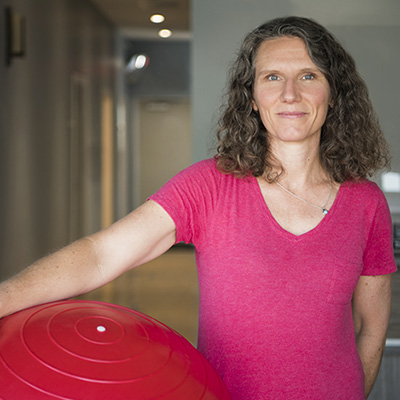Jennifer Gabrys
Imagine you’re being treated by an allied health care professional, a physiotherapist or occupational therapist, for example, and you find you’re unable to remember everything your doctor told you to relay to the practitioner. You were supposed to mention a particular condition and the affected muscle group, but you can’t recall the details. You’re also not sure what part of your medical history is relevant, so you leave important bits out. You don’t want to waste anyone’s time.
If only the practitioner could consult your medical chart. Or better yet, speak with your doctor directly. But that’s not how health care practices are set up in BC. Until now.
Collaboration and information sharing are the foundation of BC’s new primary care networks (PCNs), where professionals work in partnership with one another to deliver family medicine. The team-based approach is poised to transform health care in the province.
PEA members Jennifer Gabrys and Leslie Spohr are at the leading edge of this new model of care. Both physiotherapists, they are part of the Ponderosa Primary Care Centre in Penticton, the first PCN to open in BC, in November 2019. More than 35 centres are planned to open across the province in the next three to four years.
Gabrys and Spohr, who job-share at the Ponderosa centre, say they were keen to join the new team-based model when they heard about the opportunity.
“We see how collaboration leads to effective treatment,” Spohr says.
“People are getting better care than they ever have before,” Gabrys adds.
The Ponderosa team includes six doctors and two nurse practitioners as the primary care providers. Their work is complemented by registered nurses, a dietician, occupational therapist, social worker and physiotherapists Gabrys and Spohr.
“This model was geared to be the ‘home’ for the patient,” says Spohr. “Everyone knows the patient, knows what’s going on.”
Gabrys, who specializes in pelvic health, has been practicing physiotherapy since 2000. After receiving bachelor degrees in genetics and microbiology (1994) and physiotherapy (2000) from the University of British Columbia, Gabrys worked as a physiotherapist in New York, Pennsylvania and Massachusetts. She gained experience in both private clinics and hospitals, including Massachusetts General Hospital in Boston and the teaching hospital at Harvard University. She and her husband then lived in New Mexico for several years before returning to Canada in 2017, settling in the Okanagan with their two children.
Spohr completed a degree in general biology at the University College of the Cariboo (now Thompson Rivers University), in her hometown of Kamloops, followed by a master’s degree in physiotherapy from the University of Alberta in 2009. In her early career she focused on orthopaedics, working primarily in private practice. The mother of three then pursued additional training in pelvic-health physiotherapy through BC Women’s Hospital in Vancouver, an educational experience that complements her work at Ponderosa, she says.
Both women continue to work in private practice in addition to being at Pondersa. They say the experience of working as private therapists gives them insight into the benefits of the primary care network model.
In a private setting, Gabrys explains, physiotherapists rely on the patient to provide their medical history, which may or may not be complete. Frequently, practitioners are required to track down the patient’s medical files and test results, which can lead to delays and negatively impact the delivery of care.
At Ponderosa, however, all health care professionals in the clinic have access to the patient’s history. “We get to see all of the physician notes and all the health authority notes, for example, about any surgeries,” Gabrys says.
The patient benefits again when the practitioners do what the clinics were designed to facilitate: collaboration.
“We can hold a case conference to get together and discuss the patient and make a plan to support this person,” Spohr says. “Or we can ask questions in passing in the hallway. Being in the same clinic saves a lot of time and resources.”
The benefit to the patient is clear: the patient gets better care from the right specialist with the right information at the right time.
The benefit to the professionals is equally apparent, Gabrys says. “When I see someone at the clinic, it’s frequently more of an education, a starting point for someone who might never have seen a physiotherapist before.”
The health care system as a whole is also improved by the PCN, adds Gabrys. With health care professionals supporting the work of physicians, the physicians are able to take on more clients, which reduces the waitlist for a family physician in BC.
“People are getting more well-rounded and preventative care . . . at the source of their problem. They’re getting movement and exercise, diet and nutrition, basic functioning, counselling with a social worker, all of those basic needs.”
The effects ripple even further. When people have a family doctor, they’re less likely to go to a hospital emergency room for treatment, thereby alleviating the pressure on acute emergency care.
For Spohr, the positive results she sees at the Ponderosa clinic bode well for patients and health care in British Columbia.
“As I go along this career, I realize there is no one profession that could cure or fix a person,” she says. “It takes a multidisciplinary approach. It takes many eyes, not any one practitioner. At the clinic, someone can come knock on your door and say ‘what would you do about this?’ It’s set up to allow each profession to shine and more efficiently treat the patient.”
Gabrys and Spohr feel lucky to be part of the first Primary Care Network to open in BC, a model that is helping set the stage for future centres that will deliver a similar level of well-rounded care to patients. Their experience is an affirmation of the success story of PCNs and the benefits of investing in collaborative health care.
Says Gabrys, “Collaborative care is the way of the future.”

